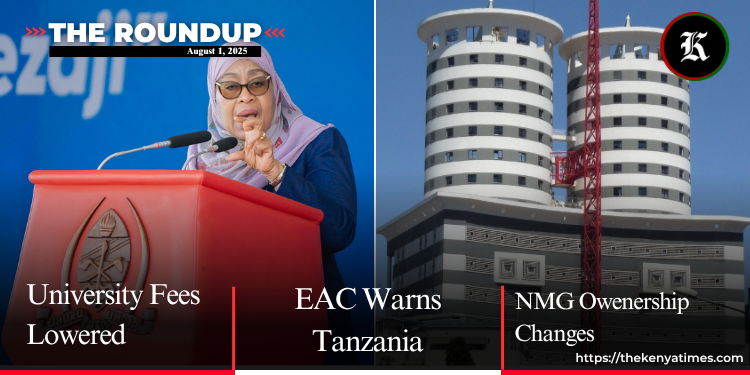Hello, Jason here. Welcome to today’s edition of The Business Roundup, your go-to digest for key local and international economic developments. From education reforms to simmering regional trade tensions and a major media shake-up—here’s what’s making headlines. In a significant policy shift, the Kenyan government has announced a reduction in university fees across all academic programmes.
The announcement is effective September 1, 2025.
Subscribe today and stay updated on top news stories in The Kenya Times Business Roundup. The Roundup presents a compilation of business stories that hit headlines throughout the week
University fees lowered across the board
This comes after growing pressure from the public over the rising cost of higher education.
A joint statement by Head of Public Service Felix Koskei and Education CS Julius Ogamba emphasized that the move aims to balance affordability with institutional sustainability.
“Public universities are notified that the entire cost of programmes will continue to be met through a combination of tuition fees, scholarships and loans based on the needs of individual students.”
Revised rates now place Humanities and Social Sciences courses at a minimum of Ksh5,814 per semester, while high-cost disciplines like Medicine, Engineering, Architecture, and Pharmacy will range from around Ksh12,000 to Ksh75,000, depending on clinical or professional levels.
The Kenya Times sampled degree courses that students can pursue for as low as Ksh5K per semester, and the most and least expensive courses across universities after fee review.

Regional tensions rise over Tanzania trade ban
Meanwhile, regional economic unity is facing fresh headwinds. On July 31, the East African Community (EAC) Secretariat issued a formal warning to Partner States following Kenya’s complaint about Tanzania’s recent decision to ban foreigners from operating in 15 small-scale business sectors.
The recently enacted Tanzania Finance Act, 2025, and amendments to the Excise (Management and Tariff) Act, 2019, introduces excise duties and an Industrial Development Levy of 10% and 15%, respectively.
Additionally, the Business Licensing (Prohibition of Business Activities for Non-Citizens) Order, 2025 bars foreigners—including EAC nationals—from participating in 15 key services, including operating or owning micro and small industries.
Kenya’s EAC Principal Secretary Dr. Caroline Karugu labeled the move a violation of the Common Market Protocol, which ensures free movement and business rights across member states.
The EAC urged all members to refrain from “unilateral backtracking” on previously liberalized sectors, stressing that such actions threaten regional integration goals.
What Dr. Karugu said:
“The Order undermines the core objectives of regional economic integration and poses a significant setback to the gains made under the East African Community Common Market Protocol.”
Earlier, Trade and Industry CS Lee Kinyanjui had noted that all EAC Partner States made binding commitments, and Article 13 of the EAC Common Market Protocol specifically allows EAC nationals to establish and operate businesses.
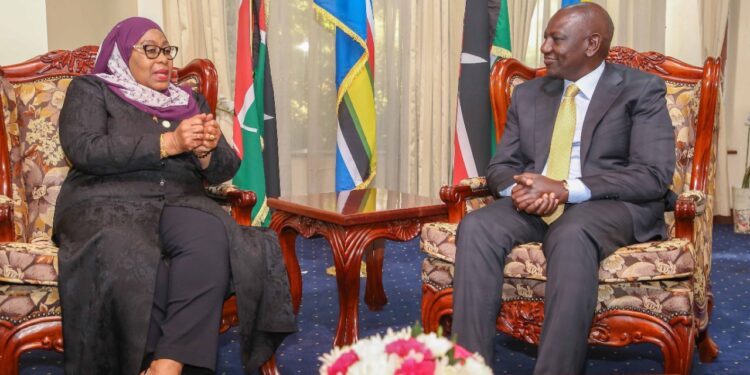
NMG restructures ownership, control remains unchanged
In corporate news, Nation Media Group Plc (NMG) is set for an internal ownership change. The Aga Khan Fund for Economic Development (AKFED) will transfer its 54.08% stake in NMG to its Kenyan-based subsidiary NPRT Holdings Africa Limited.
The transfer of 92.6 million shares, confirmed in a regulatory notice on July 30, will not affect management, control, or operations. The reorganization is framed as part of AKFED’s strategy to localize ownership while maintaining its position as the ultimate beneficial owner.
Shareholders and potential investors have been advised to take note of the new developments when dealing in the shares of NMG and to seek professional advice where necessary.
US tightens visa interview policy
Shifting to global developments, starting September 2, 2025, most nonimmigrant visa applicants to the United States will be required to attend in-person interviews, even for renewals. This reverses earlier pandemic-era waivers.
The new rules apply to nearly all age groups, eliminating previous exemptions for applicants under 14 and over 79.
Also big this Week
- A new tuberculosis (TB) vaccine candidate, M72/AS01E, has entered Phase III clinical trials, with Kenyans among the 20,000 global participants enrolled by GlaxoSmithKline (GSK).
- Sanlam General Insurance and Jubilee Allianz General Insurance (K) Ltd have issued a notice of intention to merge their general insurance businesses, pending approval from the Insurance Regulatory Authority.
- Ministry of Education announces date for university students to receive HELB funds in their bank accounts.
- How businesses will be affected by NACADA’s proposed tough alcohol rules.
- Kalahari Cement Limited has signed binding agreements to acquire a 28.2% stake in cement manufacturer, East African Portland Cement Plc (EAPC), from two shareholders: Associated International Cement Ltd (AIC) and Cementia Holding AG.
- The East African Breweries PLC (EABL) posted a profit of Ksh12.198 billion for the year ended June 30, 2025. In the audited results, the EABL Board of Directors said the net revenue grew by 49% to Ksh128.8 billion, while volume grew 2% as both beer and spirits registered growth across markets.
- Dominic Grainger has resigned as a Non-Executive Director of WPP Scangroup Plc effective 31st July 2025.
- How first years and continuing university students can check fees after review.
- Former ICT Cabinet Secretary Margaret Ndung’u has been appointed to the Digital Public Infrastructure (DPI) Safeguards Strategic Advisory Board at the United Nations Development Programme (UNDP).
Currency trends
According to the latest Central Bank of Kenya (CBK) data, the Kenyan Shilling exchanged at Ksh129.2383 per US dollar on August 1, 2025.
Against other major currencies, the Shilling traded at:
- Sterling Pound – Ksh170.5816
- Euro – Ksh147.6483
- South African Rand – 7.0940
- Japanese Yen (100 units) – Ksh85.8527
Against regional currencies, the Shilling exchanged at:
- Ugandan Shilling – Ksh27.7395
- Tanzanian Shilling – Ksh19.8857
- Rwandan Franc – Ksh11.1772
Also, Kenya’s foreign exchange reserves declined slightly to $10,692 million (4.7 months of import cover) as of August 1, down from $10,749 million the previous week.
That’s it for today’s briefing. Stay sharp and informed—your edge in business starts with the facts.
Until next time.
Follow our WhatsApp Channel and X Account for real-time news updates.
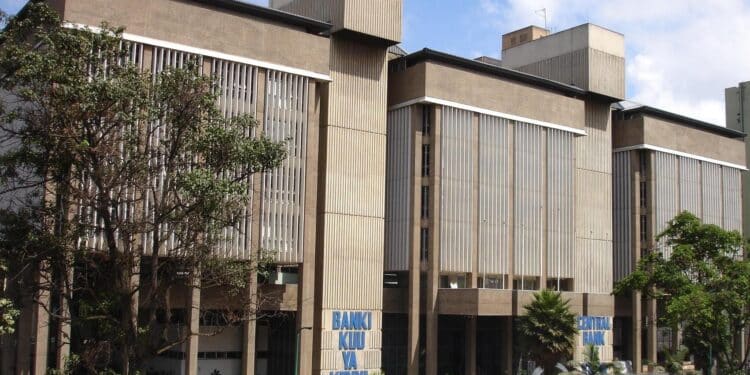





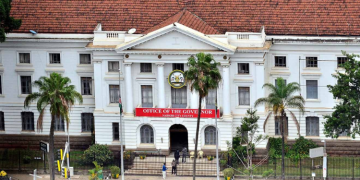













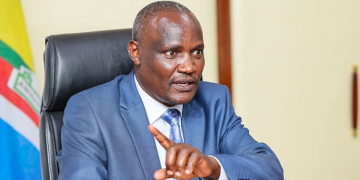
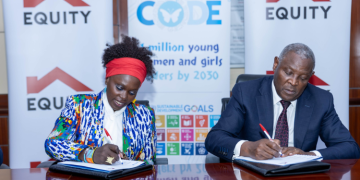




























![Senator Allan Chesang And Chanelle Kittony Wed In A Colourful Ceremony [Photos] Trans Nzoia Senator Allan Chesang With Channelle Kittony/Oscar Sudi]( https://thekenyatimescdn-ese7d3e7ghdnbfa9.z01.azurefd.net/prodimages/uploads/2025/11/Trans-Nzoia-Senator-Allan-Chesang-with-Channelle-KittonyOscar-Sudi-360x180.png)




















